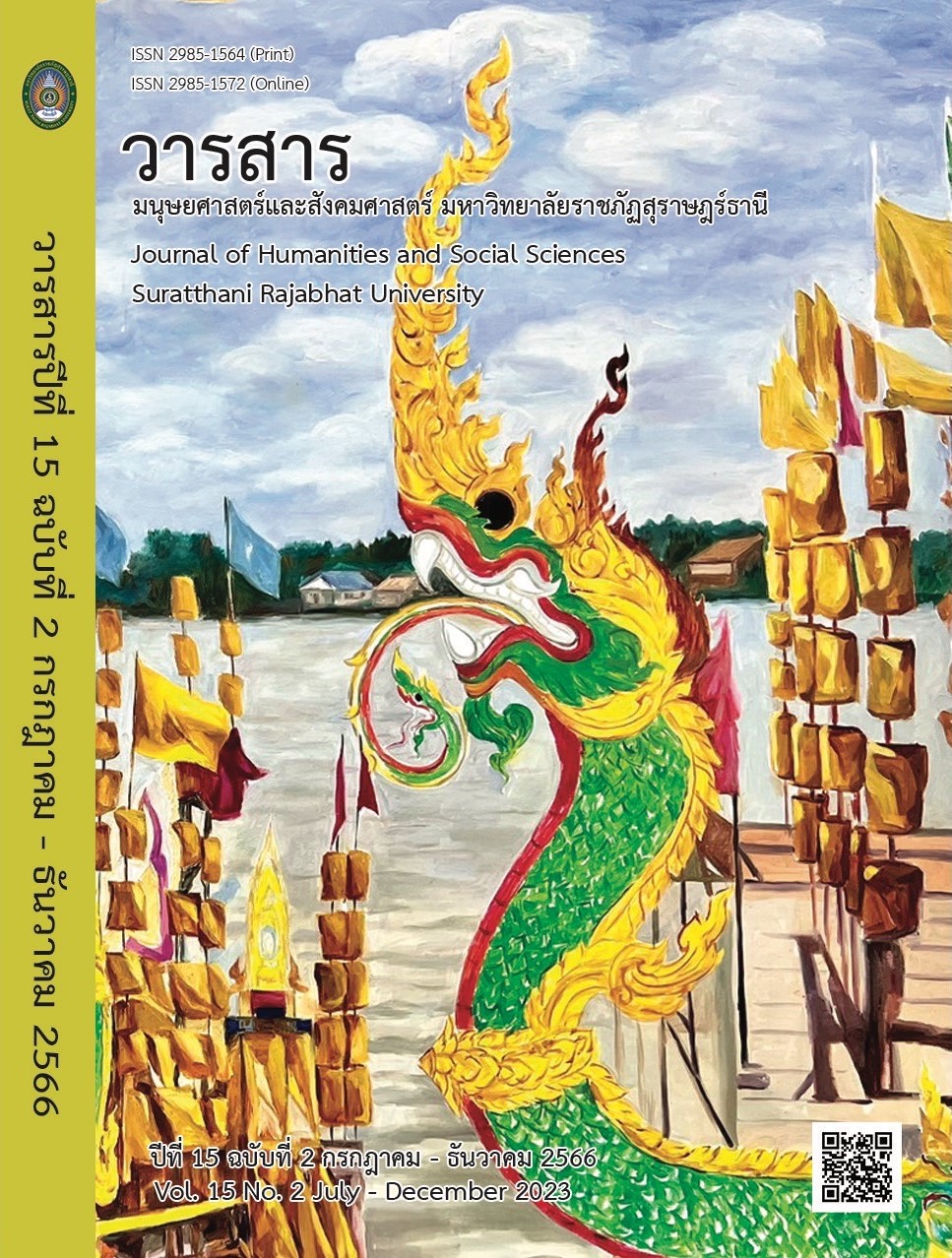Handbook Guideline for Writing Research Articles in Social Sciences for Academic Journals
Main Article Content
Abstract
The objectives of this research article were to: 1) analyze the writing patterns of social science research articles from the national level, Group 1, and ASEAN regional level academic journals in Thailand; 2) develop a
template for writing social science research articles in academic journals, and 3) evaluate the quality and endorse the template for writing social
science research articles in academic journals. A Mixed-methods research that utilized qualitative research through document analysis. The data
collection using purposive sampling were 30 social science journals
accredited for quality and included in the Thai Journal Citation Index Center database, round 4, for 2020-2024. The data was collected by searching the journal websites and using a data collection form. The data analysis
categorizes and structures the main themes and topics. For quantitative
research, a quality assessment and validation of the data collection
instrument were conducted with a simple random of 15 participants through an online platform. The data were analyzed using descriptive statistics to determine the mean and standard deviation and present the findings of the descriptive analytics.
Results indicated that: 1) the format of research articles consisted of important components, including the title, authors' names, abstract,
keywords, introduction, research objectives, research methodology, research findings, discussion, recommendations, and references; 2) the research
article writing manual which related to the research article format; introduction section, detailed section, and conclusion section; 3) overall, the manual prototype was the high qualified level (X=4.32, S.D.=0.65, X=4.35, S.D.=0.61).
The analysis results of the manual prototype showed that design methods, creation of procedures, processes, and recommendations for
writing social science research articles based on the systematic analysis and explanation of data would help writing clearly and concisely.
Article Details

This work is licensed under a Creative Commons Attribution-NonCommercial-NoDerivatives 4.0 International License.
All published manuscripts have been verified by peer-peer professors in the fields of humanities and social sciences. Reprinting of the article must be authorized by the editorial staff.
References
ธนาวิชญ์ จินดาประดิษฐ์, และ จารุวรรณ ณ ยอดระฆัง. (2552). การจัดทำคู่มือการปฏิบัติ
งาน. กรุงเทพฯ: สำนักงานคณะกรรมการพัฒนาระบบราชการ.
บุญชม ศรีสะอาด. (2560). หลักการวิจัยเบื้องต้น (พิมพ์ครั้งที่ 10). กรุงเทพฯ: สุวีริยา
สาส์น.
พรรณี ลีกิจวัฒนะ. (2558). วิธีวิจัยทางการศึกษา. กรุงเทพฯ: มีน เซอร์วิส ซัพพลาย.
พิชิต ฤทธิ์จำรูญ. (2552). รายงานการวิจัย : เขียนอย่างไรให้มีคุณภาพ. ใน สำนักงาน
เลขาธิการคุรุสภา (บ.ก.), การวิจัยเพื่อพัฒนาวิชาชีพทางการศึกษา : แนวคิดสู่
การปฏิบัติ. (น.194-228). กรุงเทพฯ: ศรีอนันต์การพิมพ์.
มสารัศม์ ฤกษ์ศานติวงษ์, ทวีศักดิ์ รูปสิงห์, ปิยะ กรกชจินตนาการ, และ วิไล รังสาดทอง.
(2562). การพัฒนารูปแบบการสอนงานของหัวหน้างานเพื่อการทำผลงาน
วิชาการสำหรับบุคลากรสายสนับสนุน. วารสารวิชาการครุศาสตร์อุตสาหกรรม
พระจอมเกล้าพระนครเหนือ, 10(1), 174-182.
มหาวิทยาลัยราชภัฏนครราชสีมา. (2564). คำสั่งมหาวิทยาลัยราชภัฏนครราชสีมา
ที่ 5764/2564 เรื่องแต่งตั้งคณะกรรมการดำเนินงานจัดทำวารสารชุมชนวิจัย
มหาวิทยาลัยราชภัฏนครราชสีมา. นครราชสีมา: มหาวิทยาลัยราชภัฏ
นครราชสีมา. (เอกสารอัดสำเนา).
รุจิรา ริคารมย์. (2563). ต้นแบบคู่มือการเขียนบทความสำหรับวารสารชุมชนวิจัย
มหาวิทยาลัยราชภัฏนครราชสีมา. นครราชสีมา: มหาวิทยาลัยราชภัฏ
นครราชสีมา.
ศูนย์ดัชนีการอ้างอิงวารสารไทย. (2563). เกณฑ์การประเมินคุณภาพวารสารวิชาการที่อยู่
ในฐาน TCI รอบที่ 4. https://tci-thailand.org/?p=1306
สิทธิ์ ธีรสรณ์. (2555). จากงานวิจัยสู่บทความวิชาการ (พิมพ์ครั้งที่ 2). กรุงเทพฯ: สำนัก
พิมพ์แห่งจุฬาลงกรณ์มหาวิทยาลัย.
สิน พันธุ์พินิจ. (2560). คู่มือการเขียนบทความวิชาการเพื่อตีพิมพ์. กรุงเทพฯ: วิทยพัฒน์.
สุภานันท์ ปั้นงาม. (2561). การพัฒนาคู่มือการจัดการเรียนรู้แบบร่วมมือเทคนิค STAD
ร่วมกับกระบวนการแก้ปัญหาของโพลยา ที่มีผลต่อพฤติกรรมความร่วมมือความ
สามารถในการแก้ปัญหา และผลสัมฤทธิ์ทางการเรียนกลุ่มสาระการเรียนรู้
คณิตศาสตร์ ชั้นประถมศึกษาปีที่ 3. วิทยานิพนธ์ ค.ม. (การวิจัยและพัฒนาการ
ศึกษา). สกลนคร: มหาวิทยาลัยราชภัฏสกลนคร.
สุเทพ ไชยวุฒิ. (2560). การพัฒนาคู่มือบริหารจัดการงานวิชาการของคณะครุศาสตร์
มหาวิทยาลัยราชภัฏเชียงใหม่. วิทยานิพนธ์ ค.ม. (การบริหารการศึกษา).
เชียงใหม่: มหาวิทยาลัยราชภัฏเชียงใหม่.
สำนักงานคณะกรรมการพัฒนาระบบราชการ. (2552). การจัดทำคู่มือการปฏิบัติงาน
(Work Manual). http://www.sc.su.ac.th/knowledge/work-manual.
สำนักงานสถิติแห่งชาติ. (ม.ป.ป.). เทคนิคการสุ่มตัวอย่างและการประมาณค่า. http://
service.nso.go.th/nso/nsopublish/Toneminute/files/55/A3-16.pdf
Bem, D. J. (1987). Writing the empirical journal article. In M. P. Zanna & J. M.
Dariey (Eds.), The compleat academic: A practical guide for the
beginning social scientist, (pp. 171-201). New York: Random House.
Best, J. W. (1981). Research in Education (4thed). New Jersey: Prentice-Hall.
Dergaa, I., Chamari, K., Zmijewski, P., & Saad, H. B. (2023). From human writing
to artificial intelligence generated text: examining the prospects and
potential threats of ChatGPT in academic writing. Biology of Sport,
(2), 615-622. https://doi.org/10.5114/biolsport.2023.125623
Diamond, I. R., Grant, R. C., Feldman, B. M., Pencharz, P. B., Ling, S. C., Moore,
A. M., & Wales, P. W. (2014). Defining consensus: a systematic review
recommends methodologic criteria for reporting of Delphi studies.
Journal of Clinical Epidemiology, 67(4), 401-409.
Ferguson, S. L., Sam, C., & Elder, B. (2023). Making the Academic Writing
Process Explicit for Doctoral Students in the Social Sciences. The
Qualitative Report, 28(2), 495-516. https://doi.org/10.46743/2160-
/2023.5464
Gero, K. I., Long, T., & Chilton, L. B. (2023, April). Social dynamics of AI
support in creative writing. In Proceedings of the 2023 CHI
Conference on Human Factors in Computing Systems (pp. 1-15).
https://doi.org/ 10.1145/3544548.3580782
Hajati, K., & Amaliah, N. (2022). Teacher’s Delivery Format and ADDIE Model
to Adjust the Online Learning System during the Pandemic Period.
Indonesian Research Journal in Education| IRJE|, 6(1), 91-104.
Nwagwu, W. (2023). “Digesting the abundance of idol matter” key factors in
personal information management experiences of selected social
science faculty. VINE Journal of Information and Knowledge
Management Systems, 53(3), 544-565. https:doi.org 10.1108/VJIK
MS-10-2020-0182
Qasem, F. A. A., & Zayid, E. I. M. (2019). Challenges and problems faced by
students in the early stage of writing research projects in L2,
University Of Bisha, Saudi Arabia. European Journal of Special
Education Research, 4(1), 32-47. https://doi.org/10.4236/
jss.2020.812004
Sundar, S. S., Kang, J., & Oprean, D. (2017). Being there in the midst of the
story: How immersive journalism affects our perceptions and
cognitions. Cyberpsychology, behavior, and social networking,
(11), 672-682. https:doi.org 10.1089/cyber.2017.0271
Thai Journal Finder. (2563). เว็บไซต์รวบรวมวารสารวิชาการที่ปรากฏในฐานข้อมูล
ของศูนย์ดัชนีอ้างอิงวารสารไทย (TCI). https://libservice.kku.ac.th/tjf/
index.php
Willer, D. (1986). Scientific Sociology : Theory and method. Englewood cliffs,
New Jersey: Prentice-Hall.
Yang, M. (2023). Supervisory feedback, reflection, and academic discourse
socialization: Insights from an L2 doctoral student's paper writing
experience. Journal of English for Academic Purposes, 62, 101215.


